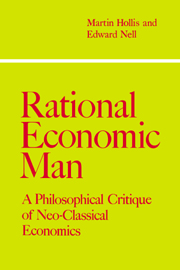Book contents
- Frontmatter
- Contents
- Preface
- Introduction
- 1 Relevance and falsification
- 2 Rational economic man
- 3 Theory and hypothesis
- 4 Facts and theories
- 5 Behaviour and prediction
- 6 A priori knowledge
- 7 Deductive explanation
- 8 The assumptions of neo-Classicism
- 9 Rationalist foundations for economic theory
- Bibliography
- Index
- Frontmatter
- Contents
- Preface
- Introduction
- 1 Relevance and falsification
- 2 Rational economic man
- 3 Theory and hypothesis
- 4 Facts and theories
- 5 Behaviour and prediction
- 6 A priori knowledge
- 7 Deductive explanation
- 8 The assumptions of neo-Classicism
- 9 Rationalist foundations for economic theory
- Bibliography
- Index
Summary
Rational Economic Man took the stage in Chapter 2, where we presented him as the embodiment of maximising models. He failed to steal the show, however, partly because he fell foul of the analytic-synthetic distinction and partly because behaviourism turned all models trivially into maximising models. We concluded that, if we could dispense with behaviourism, we could rescue much orthodox economic theory. In this chapter we shall press home our objections to behaviourism but the prospective rescue of orthodox theory will prove illusory. Even after shedding behaviourism, neo-Classicists still turn out to have a wrong notion of what an economic action is.
We shall begin by assessing the attraction of behaviourism for a Positivist science of prediction, based on regularities in nature. The existence of fallible human agents acting according to their idiosyncratic beliefs and intentions seems a threat to such a science and behaviourism removes the threat. Nevertheless we repeat that maximising models are distinguishable from others, only if economic behaviour is construed as a species of action proceeding from inner reflection. So the question will then become whether this notion of action can be squared with revealed preference theory, which is the Positive economist's version of demand theory. We shall contend first that optimising models are not straightforwardly predictive, although revealed preference theory would require them to be, and secondly that there is, in any case, no way of knowing what preferences are revealed by observable behaviour. Economic actions, we shall find, are to be explained in terms of inner preferences, thus casting doubt on the neo-Classical concept of preference. Can we then restate neo-Classical economics as a theory of economic action? No, we argue, neo-Classical actions are timeless fictions,
- Type
- Chapter
- Information
- Rational Economic Man , pp. 114 - 139Publisher: Cambridge University PressPrint publication year: 1975



